23 feb 2019
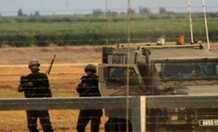
Israeli forces opened fire towards Palestinian shepherds, on Saturday morning, in the besieged Gaza Strip.
Witnesses told a Ma'an reporter said that Israeli forces opened fire, targeting Palestinian shepherds herding their sheep in the Malaka area in the eastern Gaza Strip.
No injuries were reported.
The Israeli army also regularly detains and opens fire on unarmed Palestinian fishermen, shepherds, and farmers along the border areas if they approach the buffer zone, as the authorities have not made clear the precise area of the designated zone.
The practice has in effect destroyed much of the agricultural and fishing sector of the blockaded coastal enclave, which has been under an Israeli air, land, and sea blockade for nearly 12 years.
Witnesses told a Ma'an reporter said that Israeli forces opened fire, targeting Palestinian shepherds herding their sheep in the Malaka area in the eastern Gaza Strip.
No injuries were reported.
The Israeli army also regularly detains and opens fire on unarmed Palestinian fishermen, shepherds, and farmers along the border areas if they approach the buffer zone, as the authorities have not made clear the precise area of the designated zone.
The practice has in effect destroyed much of the agricultural and fishing sector of the blockaded coastal enclave, which has been under an Israeli air, land, and sea blockade for nearly 12 years.
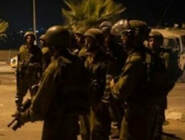
Israeli soldiers shot, on Saturday evening, a young Palestinian man at the entrance of the al-‘Arroub refugee camp, north of Hebron, in the southern part of the occupied West Bank.
Medical sources said the soldiers shot Mohammad ‘Ata al-As’ees, with a live round in his leg, causing a minor injury.
They added that the soldiers fired many live rounds at random, while attacking protesters in the refugee camp, also causing many Palestinians to suffer the effects of teargas inhalation.
The soldiers also installed a military roadblock at the main entrance of Kharsa village, near Hebron, before stopping and searching dozens of Palestinian cars, and interrogated many residents while inspecting their ID cards.
Medical sources said the soldiers shot Mohammad ‘Ata al-As’ees, with a live round in his leg, causing a minor injury.
They added that the soldiers fired many live rounds at random, while attacking protesters in the refugee camp, also causing many Palestinians to suffer the effects of teargas inhalation.
The soldiers also installed a military roadblock at the main entrance of Kharsa village, near Hebron, before stopping and searching dozens of Palestinian cars, and interrogated many residents while inspecting their ID cards.
22 feb 2019
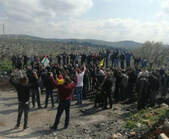
Israeli soldiers injured, Friday, several Palestinians during the weekly procession in Kufur Qaddoum village, east of the northern West Bank city of Qalqilia.
Morad Eshteiwi, the coordinator of the Popular Committee against the Annexation Wall and Colonies in Kufur Qaddoum, said the Palestinians and international peace activists marched from the local park, and headed to the nearby closed main road.
He added that the soldiers started firing rubber-coated steel bullets, gas bombs and concussion grenades, causing many to suffer the effects of teargas inhalation.
Eshteiwi also stated that the Palestinians in Kufur Qaddoum will continue their protests despite the excessive use of force by the army, and that they insist on their legitimate demand to have the main entrance of their village reopened.
It is worth mentioning that the army closed the main road more than fifteen years ago, to enable easy access to colonialist settlers, driving to and from the illegal Kedumim colony, which was built on private Palestinian lands.
Friday’s procession, which was violently attacked by the soldiers, included various peaceful activities, such as recreational activities for children provided by the Psychological Department of the Palestinian Education Ministry in Qalqilia.
Kufur Qaddoum witnesses frequent Israeli military invasion, including the violent searches of homes and property, in addition to the abduction and imprisonment of many of its residents, especially young men and teenagers.
Morad Eshteiwi, the coordinator of the Popular Committee against the Annexation Wall and Colonies in Kufur Qaddoum, said the Palestinians and international peace activists marched from the local park, and headed to the nearby closed main road.
He added that the soldiers started firing rubber-coated steel bullets, gas bombs and concussion grenades, causing many to suffer the effects of teargas inhalation.
Eshteiwi also stated that the Palestinians in Kufur Qaddoum will continue their protests despite the excessive use of force by the army, and that they insist on their legitimate demand to have the main entrance of their village reopened.
It is worth mentioning that the army closed the main road more than fifteen years ago, to enable easy access to colonialist settlers, driving to and from the illegal Kedumim colony, which was built on private Palestinian lands.
Friday’s procession, which was violently attacked by the soldiers, included various peaceful activities, such as recreational activities for children provided by the Psychological Department of the Palestinian Education Ministry in Qalqilia.
Kufur Qaddoum witnesses frequent Israeli military invasion, including the violent searches of homes and property, in addition to the abduction and imprisonment of many of its residents, especially young men and teenagers.
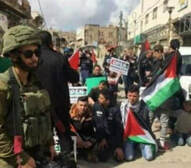
Israeli soldiers attacked, Friday, a nonviolent procession in the center of Hebron city, in the southern part of the occupied West Bank, marking the 25th anniversary of the Ibrahimi Mosque Massacre.
Media sources said the soldiers injured one child with the rubber-coated steel bullet, and caused many Palestinians to suffer the effects of teargas inhalation.
The protesters were also demanding the army to reopen the Shuhada Street, in the Old City, which has been closed since the massacre, and called for a complete Israeli withdrawal from the city.
They carried Palestinian flags, and chanted for the liberation of Palestine, in addition to condemning Israel’s illegal expulsion of the international observers of the Temporary International Presence in Hebron (TIPH).
On February 25, 1994, an American-Israeli physician identified as Baruch Goldstein, who resided in the ultra-fanatic Keryat Arba settlement in Hebron, walked into the mosque as a large number of Muslim Ramadan worshipers, mainly elderly, were praying and opened fire at random from his Israeli army-issued machine gun leading to the large number of deaths and injuries.
To make matters worse, Israeli soldiers, who were in the vicinity of the mosque, closed the doors to the mosque and prevented the worshippers from running for their lives. They also prevented people from outside to enter it to help in evacuating the dead and wounded.
Residents who wanted to reach the mosque, and those inside, fought with the soldiers, leaving an additional number dead and injured. Later, related violence raised the number of Palestinians killed on that day to 50, in Hebron alone, and to 60, adding those killed in confrontations that broke out elsewhere in the West Bank, against Israeli occupation forces.
Immediately following the massacre, Israel decided to punish the victims by closing down the old town of Hebron, where the Ibrahimi mosque is located, for six months.
An all-Israeli committee was formed to probe the massacre, instead of punishing the settlers, to divide the mosque between Muslims and Jews, and to close down several commercial streets, most famously Shuhada Street, which remains closed for Palestinians until today.
Army checkpoints were also set up to restrict the movement of Palestinians, while Israeli settlers continued to move freely and without any restrictions.
Media sources said the soldiers injured one child with the rubber-coated steel bullet, and caused many Palestinians to suffer the effects of teargas inhalation.
The protesters were also demanding the army to reopen the Shuhada Street, in the Old City, which has been closed since the massacre, and called for a complete Israeli withdrawal from the city.
They carried Palestinian flags, and chanted for the liberation of Palestine, in addition to condemning Israel’s illegal expulsion of the international observers of the Temporary International Presence in Hebron (TIPH).
On February 25, 1994, an American-Israeli physician identified as Baruch Goldstein, who resided in the ultra-fanatic Keryat Arba settlement in Hebron, walked into the mosque as a large number of Muslim Ramadan worshipers, mainly elderly, were praying and opened fire at random from his Israeli army-issued machine gun leading to the large number of deaths and injuries.
To make matters worse, Israeli soldiers, who were in the vicinity of the mosque, closed the doors to the mosque and prevented the worshippers from running for their lives. They also prevented people from outside to enter it to help in evacuating the dead and wounded.
Residents who wanted to reach the mosque, and those inside, fought with the soldiers, leaving an additional number dead and injured. Later, related violence raised the number of Palestinians killed on that day to 50, in Hebron alone, and to 60, adding those killed in confrontations that broke out elsewhere in the West Bank, against Israeli occupation forces.
Immediately following the massacre, Israel decided to punish the victims by closing down the old town of Hebron, where the Ibrahimi mosque is located, for six months.
An all-Israeli committee was formed to probe the massacre, instead of punishing the settlers, to divide the mosque between Muslims and Jews, and to close down several commercial streets, most famously Shuhada Street, which remains closed for Palestinians until today.
Army checkpoints were also set up to restrict the movement of Palestinians, while Israeli settlers continued to move freely and without any restrictions.
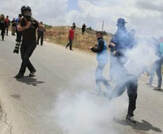
Israeli soldiers attacked, Friday, dozens of Palestinian, Israeli and international peace activists, holding the weekly nonviolent procession against the illegal Annexation Wall and Colonies, in Bil’in village, west of the central West Bank city of Ramallah.
The protesters marched from the center of the village, and headed towards Abu Lemon area, near the Annexation Wall, which is isolating the Palestinians from their orchards.
Israeli soldiers then started firing rubber-coated steel bullets, gas bombs and concussion grenades, causing scores of nonviolent protesters to suffer the effects of teargas inhalation.
The protesters started their nonviolent procession by carrying Palestinian flags, and chanting for unity, ongoing resistance, liberty, the release of all detainees and the Right of Return of the refugees.
They also marked the fourteenth anniversary of the ongoing nonviolent weekly processions, and called for ending the Israeli violations against the Palestinians, their homes and lands, and their holy sites, especially the escalating violation against the Al-Aqsa Mosque in occupied Jerusalem.
In related news, the soldiers attacked the weekly procession in the nearby village of Ni’lin, causing many to suffer the effects of teargas inhalation.
The protesters were also marking the fiftieth anniversary of the establishment of the Democratic Front for the Liberation of Palestine (DFLP).
The protesters marched from the center of the village, and headed towards Abu Lemon area, near the Annexation Wall, which is isolating the Palestinians from their orchards.
Israeli soldiers then started firing rubber-coated steel bullets, gas bombs and concussion grenades, causing scores of nonviolent protesters to suffer the effects of teargas inhalation.
The protesters started their nonviolent procession by carrying Palestinian flags, and chanting for unity, ongoing resistance, liberty, the release of all detainees and the Right of Return of the refugees.
They also marked the fourteenth anniversary of the ongoing nonviolent weekly processions, and called for ending the Israeli violations against the Palestinians, their homes and lands, and their holy sites, especially the escalating violation against the Al-Aqsa Mosque in occupied Jerusalem.
In related news, the soldiers attacked the weekly procession in the nearby village of Ni’lin, causing many to suffer the effects of teargas inhalation.
The protesters were also marking the fiftieth anniversary of the establishment of the Democratic Front for the Liberation of Palestine (DFLP).
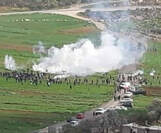
Israeli soldiers shot, Friday, three Palestinians with the illegal expanding “Toto” bullets and caused dozens to suffer the effects of teargas inhalation, in the al-Mughayyir village, northeast of Ramallah, in central West Bank.
The Palestinians held a nonviolent procession on lands Israel intends to illegally confiscate for its colonialist activities, and held noon prayers.
They then held a procession demanding an end to Israel’s violations against the Palestinians and their lands, before the soldiers attacked them with live rounds, rubber-coated steel bullets, gas bombs and concussion grenades. video
Medical sources said three Palestinians were shot with live fire; one in his chest and two in their legs, before they were moved to a local hospital.
Palestinian medics also provided the needed treatment to many residents who suffered the effects of teargas inhalation.
The Palestinians held a nonviolent procession on lands Israel intends to illegally confiscate for its colonialist activities, and held noon prayers.
They then held a procession demanding an end to Israel’s violations against the Palestinians and their lands, before the soldiers attacked them with live rounds, rubber-coated steel bullets, gas bombs and concussion grenades. video
Medical sources said three Palestinians were shot with live fire; one in his chest and two in their legs, before they were moved to a local hospital.
Palestinian medics also provided the needed treatment to many residents who suffered the effects of teargas inhalation.
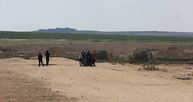
The Israeli occupation bulldozers launched on Friday morning a limited incursion into Palestinian lands in eastern al-Bureij refugee camp, in central Gaza Strip.
A flock of Israeli army bulldozers moved into the border fence in eastern al-Bureij refugee camp and al-Awda camp.
The bulldozers raked through the area and leveled Palestinian lands amid intermittent discharge of gunfire.
The incursions are the latest in a series of Israeli violations of the Cairo-brokered ceasefire accord signed in the wake of the 2014 offensive on the besieged coastal enclave.
A flock of Israeli army bulldozers moved into the border fence in eastern al-Bureij refugee camp and al-Awda camp.
The bulldozers raked through the area and leveled Palestinian lands amid intermittent discharge of gunfire.
The incursions are the latest in a series of Israeli violations of the Cairo-brokered ceasefire accord signed in the wake of the 2014 offensive on the besieged coastal enclave.
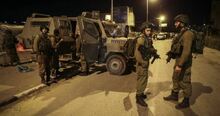
A Palestinian lady was transferred to a hospital for urgent treatment shortly after heavily-armed Israeli forces cordoned off the southern occupied West Bank city of al-Khalil and wreaked havoc on Palestinian homes.
Local sources said Israeli soldiers ransacked civilian homes in al-Khalil, including the home of Palestinian citizen Mutassem al-Natsha.
The latter’s wife was rushed to a local hospital as a result of the panic wrought by the arbitrary assault.
At the same time, Israeli troops rolled into Dura town, to the south of al-Khalil, and ravaged Palestinian ex-prisoners’ homes.
Ex-prisoner Bassam al-Zeir said a full-armed patrol broke into his family home in Wad Abu al-Kamra neighborhood and forced the residents out, before they smashed the property and entrance gates.
The occupation forces further sealed off the access roads to the city with a set of flying military checkpoints, where Palestinian drivers and civilians have been made to endure exhaustive inspection.
Local sources said Israeli soldiers ransacked civilian homes in al-Khalil, including the home of Palestinian citizen Mutassem al-Natsha.
The latter’s wife was rushed to a local hospital as a result of the panic wrought by the arbitrary assault.
At the same time, Israeli troops rolled into Dura town, to the south of al-Khalil, and ravaged Palestinian ex-prisoners’ homes.
Ex-prisoner Bassam al-Zeir said a full-armed patrol broke into his family home in Wad Abu al-Kamra neighborhood and forced the residents out, before they smashed the property and entrance gates.
The occupation forces further sealed off the access roads to the city with a set of flying military checkpoints, where Palestinian drivers and civilians have been made to endure exhaustive inspection.
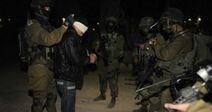
Clashes broke out at daybreak Friday between Israeli occupation forces and Palestinian civilians in the northern West Bank province of Jenin.
Local sources said Israeli soldiers kidnapped the ex-prisoner Ahmed Aweis after they wreaked havoc on his home and attacked his family.
The Israeli military showered the vicinities of Jenin’s public hospital with spates of teargas canisters, resulting in dozens of suffocation cases.
Local sources said Israeli soldiers kidnapped the ex-prisoner Ahmed Aweis after they wreaked havoc on his home and attacked his family.
The Israeli military showered the vicinities of Jenin’s public hospital with spates of teargas canisters, resulting in dozens of suffocation cases.
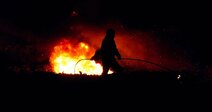
Several Palestinian citizens on Thursday evening suffered bullet injuries during night skirmishes with the Israeli occupation forces in a border area south of the Gaza Strip.
According to a spokesman for the health ministry in Gaza, four Palestinian young men was wounded by Israeli gunfire as they were rallying in the east of Rafah.
Hundreds of Palestinian youths participated in the nighttime skirmishes, which were staged as part of the March of Return events.
According to a spokesman for the health ministry in Gaza, four Palestinian young men was wounded by Israeli gunfire as they were rallying in the east of Rafah.
Hundreds of Palestinian youths participated in the nighttime skirmishes, which were staged as part of the March of Return events.
21 feb 2019
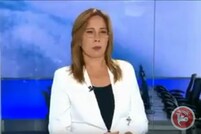
An Israeli news anchor for Channel 13 stirred controversy, over the weekend, after saying that Israel was turning soldiers into “animals” with its ongoing rule over the occupied West Bank.
Israeli news outlets reported that anchor Oshrat Kotler made her comments at the end of a news piece regarding Israeli army soldiers suspected of badly beating two bound and blindfolded Palestinian suspects following their comrades’ deaths in an attack.
The anchor said “We send children to the army, to the territories and get back animals."
"That is the result of the occupation."
After apparently being informed that her comment caused controversy by the end of the program, Kotler said “My own children and their friends are all combat soldiers," she added "My criticism was aimed only at those soldiers who have been led to harm innocents by our control over the Palestinians.”
“I’m actually in favor of easing the soldiers’ punishment, because it is we who sent them into that impossible reality.”
Parents of the accused soldiers said, in a joint statement, that Kotler’s comments were “unfortunate and ugly” and “have no place in Israeli discourse, certainly not by a news anchor who should present facts and not her warped world view."
Israeli New Right political party chief, Naftali Bennett, rebuked Kotler on Twitter, saying “Oshrat, you’re confused, IDF soldiers give their lives so that you can sleep soundly. Animals are those terrorists who murder children in their beds, a teen out for a walk or an entire family driving down the road. IDF soldiers are our children, our strength. Apologize.”
The party said it would call on Attorney General Avichai Mandelblit to launch an investigation into Kotler’s comments for libel.
Israeli news outlets reported that anchor Oshrat Kotler made her comments at the end of a news piece regarding Israeli army soldiers suspected of badly beating two bound and blindfolded Palestinian suspects following their comrades’ deaths in an attack.
The anchor said “We send children to the army, to the territories and get back animals."
"That is the result of the occupation."
After apparently being informed that her comment caused controversy by the end of the program, Kotler said “My own children and their friends are all combat soldiers," she added "My criticism was aimed only at those soldiers who have been led to harm innocents by our control over the Palestinians.”
“I’m actually in favor of easing the soldiers’ punishment, because it is we who sent them into that impossible reality.”
Parents of the accused soldiers said, in a joint statement, that Kotler’s comments were “unfortunate and ugly” and “have no place in Israeli discourse, certainly not by a news anchor who should present facts and not her warped world view."
Israeli New Right political party chief, Naftali Bennett, rebuked Kotler on Twitter, saying “Oshrat, you’re confused, IDF soldiers give their lives so that you can sleep soundly. Animals are those terrorists who murder children in their beds, a teen out for a walk or an entire family driving down the road. IDF soldiers are our children, our strength. Apologize.”
The party said it would call on Attorney General Avichai Mandelblit to launch an investigation into Kotler’s comments for libel.
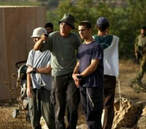
A group of illegal Israeli colonialist settlers attacked, Thursday, Orif Secondary School, in Orif village, south of Nablus, in northern West Bank.
Adel al-‘Amer, the secretary of Orif Village Council, told the Palestinian News & Info Agency (WAFA) that the colonists attacked the school just as the students were leaving it.
He added that the attack was the second this week alone, and that Israeli soldiers started firing gas bombs and rubber-coated steel bullets at the students, instead of removing the colonists.
Al-‘Amer stated said that the assailants also attacked Palestinian homes near the school, leading to protests.
Adel al-‘Amer, the secretary of Orif Village Council, told the Palestinian News & Info Agency (WAFA) that the colonists attacked the school just as the students were leaving it.
He added that the attack was the second this week alone, and that Israeli soldiers started firing gas bombs and rubber-coated steel bullets at the students, instead of removing the colonists.
Al-‘Amer stated said that the assailants also attacked Palestinian homes near the school, leading to protests.
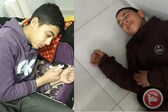
Israeli soldiers injured, Thursday, thirty Palestinians schoolchildren, including one who suffered a serious injury, after a group of soldiers and colonialist settlers attacked them, in Hebron, in southern West Bank.
Medical sources in Hebron said thirty children suffered the severe effects of teargas inhalation, including one child who suffered a serious injury, before he was rushed to Mohammad Ali Hospital in the city.
The school principal said a group of illegal colonialist settlers surrounded the school before assaulting several children and added that the soldiers then started firing gas bombs and concussion grenades at the children, instead of removing the assailing colonists.
He stated that one of the colonists who attacked the children is known as Ofar, who frequently calls for killing the Palestinians and expelling them Palestinians from Hebron, and the rest of occupied Palestine.
Medical sources in Hebron said thirty children suffered the severe effects of teargas inhalation, including one child who suffered a serious injury, before he was rushed to Mohammad Ali Hospital in the city.
The school principal said a group of illegal colonialist settlers surrounded the school before assaulting several children and added that the soldiers then started firing gas bombs and concussion grenades at the children, instead of removing the assailing colonists.
He stated that one of the colonists who attacked the children is known as Ofar, who frequently calls for killing the Palestinians and expelling them Palestinians from Hebron, and the rest of occupied Palestine.
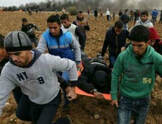
Israeli soldiers shot, on Wednesday evening, two Palestinians near the perimeter fence, east of Khan Younis, in the southern part of the coastal region.
Media sources said the soldiers, stationed across the perimeter fence, fired many live rounds at protesters on Palestinian lands, east of Khan Younis, wounding two young men in their legs, before they were rushed to Nasser Hospital in the city, suffering moderate wounds.
The soldiers also fired many high-velocity gas bombs, causing many Palestinians to suffer the effects of teargas inhalation.
In related news, Israeli army drones fired missiles into agricultural lands, a motorcycle and a structure, east of the al-Boreij refugee camp, in central Gaza, causing property damage.
According to Israeli sources, the army struck “a Hamas site in southern Gaza, after some Palestinians launched flammable balloons.”
Media sources said the soldiers, stationed across the perimeter fence, fired many live rounds at protesters on Palestinian lands, east of Khan Younis, wounding two young men in their legs, before they were rushed to Nasser Hospital in the city, suffering moderate wounds.
The soldiers also fired many high-velocity gas bombs, causing many Palestinians to suffer the effects of teargas inhalation.
In related news, Israeli army drones fired missiles into agricultural lands, a motorcycle and a structure, east of the al-Boreij refugee camp, in central Gaza, causing property damage.
According to Israeli sources, the army struck “a Hamas site in southern Gaza, after some Palestinians launched flammable balloons.”
